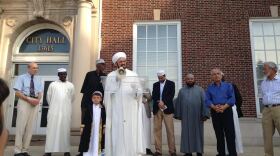Dearborn’s large Lebanese community continues to grieve those it lost in Thursday’s twin suicide bombings in Beirut.
“You’ve never seen a wife and husband love each other so much,” says Dearborn resident Mehdi Taleb of his sister, Leila Taleb, and her husband Hussein Mostapha.
They were among 43 people killed by the suicide bombings that rocked Beirut, just one day before terrorists struck Paris.
ISIS claimed credit for both attacks.
“They lived a normal life, a happy family,” says Taelb. “[Their 3-year-old son] just started going to school. [My sister] doesn’t live where the suicide bomber hit, my parents do. She left the house minutes before the bombs hit. She stopped in front of the bakery where the suicide bomber [attacked] to grab some bread and give it to my dad. She stopped there for that second. Only that second. And she’s gone.”
“I have the same emotion for the kids and innocent people in France, the same [as my] emotion for the people in Beirut,” says Taleb.
Now he’s hoping his three-year-old nephew will be able to come live with his aunts and uncles in Michigan.
“Because her son, I don’t want to say he’s very popular [in Lebanon,] but he’s all over the news. And everyone knows he lost his parents, both mom and dad. And if they can do something with the embassy, if they can give him papers so he can come live here – because I know for him to forget, he need a better life.”
Mehdi says the attackers who killed his sister and brother-in-law and orphaned his nephew “have nothing to do with Islam.”
“Innocent people, they should not pay the price for some – I don’t know what to call them,” he says. “Animals are better than them. These people, you cannot trust them. They got nothing to do with any religion, not just Islam. I don’t know what kind of creatures they are, honestly. I don’t know.”
A third person with Dearborn ties was also killed in the Beirut bombings: Leila Mazloum.
A member of her extended family, Osama Siblani – the publisher of the Arab American News – says Mazloum recently moved to Dearborn after waiting 15 years for her green card.
“She came here, and she got … a house set up and she went to Lebanon to pick up her children a month ago, and to sell their property there and to pack and to come with her husband and her four kids,” says Siblani. “And unfortunately she was a victim in the latest suicide bombing.”
Feelings of a “double standard” in reaction to Beirut and Paris attacks
Siblani and others in Dearborn feel the global outcry over the Paris attacks didn’t happen for victims of the Beirut bombings, simply because they occurred in Lebanon rather than Europe.
“I understand the calamity and I understand it’s closer to the U.S., but again, people are people and blood is blood,” says Siblani.
“And the officials, the people, the media treated the Lebanese bombings and the victims as, ‘It’s ok, those are in the strongholds of Hezbollah.’ As if they’re giving license to ISIS to kill [them] because they are fighting them in Syria. That really hurts us a lot, because I think we’re all in the same boat. So I think we should not have a double standard when it comes to dealing with calamities like this.”
Siblani criticized the city of Dearborn for not releasing any statement expressing condolences, or condemnation of the attacks, in the four days since the Beirut attacks.
The city’s public information director, Mary Laundroche, confirmed the city has not yet made a public statement, but sent the following comment to Michigan Radio today:
“I would say with certainty that the mayor expresses his condolences over these outrageous acts of violence against innocent people in Lebanon, especially those with Dearborn ties, and joins in the sadness shared by everyone around the world who is appalled by the attacks in both Beirut and in Paris.”
Commemorative services were held at the Islamic Center of American in Dearborn over the weekend for Ms. Taleb and other victims.
Meanwhile, Siblani and other community leaders say more events are planned this week to commemorate victims of the French and Lebanese terrorist attacks in Dearborn.
“The way to combat this epidemic is to send a message that there is solidarity, and that all lives have equal value,” says Kassem Allie, executive director of the Islamic Center. “And the moment we diminish the value of any life in any country, is the moment we fall into the trap that they’re setting.”
Services are being planned for both Wednesday and Sunday this week.







